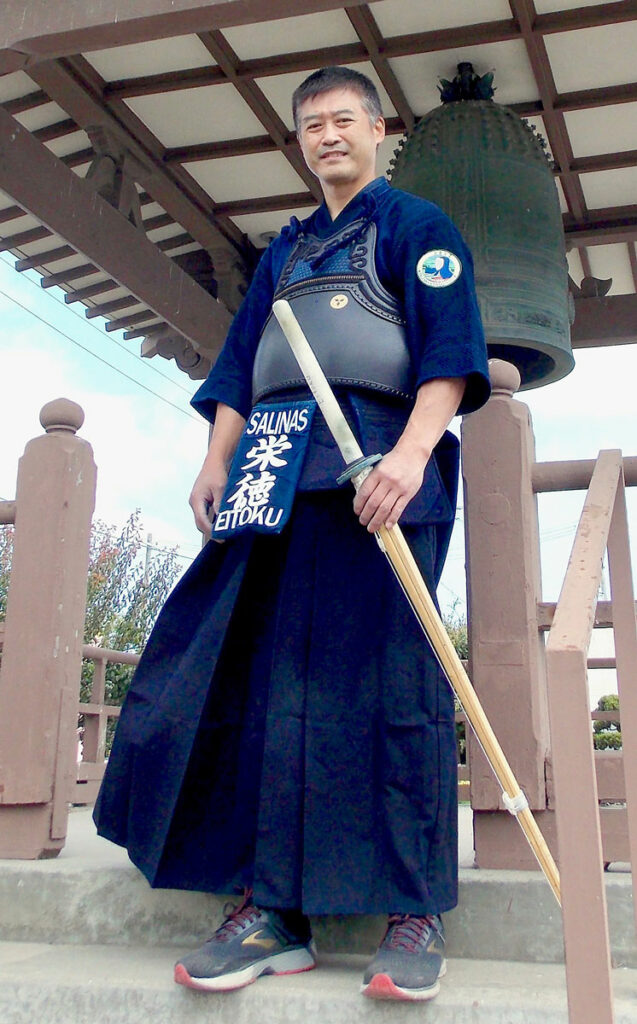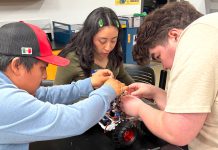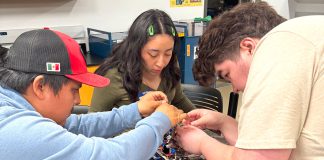
SALINAS VALLEY — “This summer, we were supposed to celebrate our 50th anniversary of the Salinas Kendo Club,” said Jimmy Eitoku, head Kendo instructor, “but then Covid-19 hit.”
Eitoku said it was supposed to be a gala event, complete with a tournament expected to attract more than 200 competitors from the United States and Canada, and a seminar given by a Kendo master flown in from Japan.
But, despite the damper that the Covid-19 pandemic has put on the celebrations, Eitoku’s enthusiasm and commitment to advocating for Kendo in the Salinas Valley remains unwavering. He wants people to know that Kendo is a martial art that not only promotes better health, but it is also a pathway to a better, more considerate and ultimately more successful self.
“Kendo’s history is long,” said the limber and slight Eitoku, 58, as he settled lightly down on a fold-up chair in the rock garden of the Salinas Buddhist Temple.
Amid manicured Jupiter trees and a landscape dotted with rugged rock formations, Eitoku said that Kendo is a type of fencing sport that evolved out of the days of the sword-wielding samurai over 800 years ago, a time when Japan lacked a strong central government and where warring clans clashed and ravaged the feudal island. For these war-weary people, developing an effective means of defensive was essential, and Kendo (meaning “the way of the sword”) proved useful.
Modern Kendo, however, Eitoku explained, has evolved, becoming less violent, for example, no longer requiring the victor to drop their opponent to the ground to win a match. Points are earned through maintaining proper form and by delivering strategic strikes to a rival with a bamboo sword. If an opponent uses too much force with a strike, they can even be reprimanded and lose points.
“Kendo then is also about learning to be a more compassionate person without needing to humiliate your rival,” Eitoku said, while adjusting his surgical mask, compliant with today’s Covid recommendation for safe and courteous social interaction.
Eitoku said respect and consideration are instilled in Kendo through teachings known as Reiho— codes of etiquette that impart reverence for one’s opponent, instructors and even for physical spaces. For instance, by requiring the Kendo pupil to bow before entering the dojo (place for training), Eitoku said that the student learns to appreciate the sacrifices of those who came before and built that structure.
“These are all qualities that not only make for a better person,” he said, “but also a more successful person, who would better inspire trust and loyalty in others.”
Adorned in his traditional Kendo uniform, a flowing shirt (called a keikogi) and long pleated trousers (hakama), and striking poses in the temple’s gym with a bamboo sword (shinai), Eitoku explained that to deliver a successful strike in Kendo, one has to take their time, size their opponent’s weakness and work to create the optimum time to strike.
“This cultivates patience, forethought and discipline, which are also skills that can prove helpful in forging a successful life by aiding in sound planning and strategic thinking,” said Eitoku, who works as a pharmacist in Gonzales.
Eitoku’s hard work and commitment to Kendo have also earned him numerous prizes, including first-place awards in the Senior Individual division as well as in the Senior Men’s Team division at the 2014 All United States Kendo Championships in San Diego.
His quest to bring the good news of Kendo to the Salinas Valley, however, had its setbacks.
“I once did a Kendo demonstration in Gonzales at a middle school, hoping people would come out and check out Kendo, but I didn’t get any takers,” Eitoku said with a chuckle.
But there have been more victories. Salinas Kendo Club today has more than 50 registered members, with Alisal High School even beginning a Kendo club, making it one of the first Kendo clubs in a public high school in the United States, according to Eitoku.
Salinas Kendo Club has also been represented at every World Kendo Championships since the 1980s, and that is pretty impressive for Eitoku, who remembers when the club was founded in 1970 with only three members. He was the first student.
“We have come a long way,” he said, “and it is something that I’m proud to have been a part of.”
Eitoku said Kendo is open to everyone, even those with physical challenges.
“A friend of mine in Hawaii has no legs and teaches Kendo. He went to the world championships,” he said.
In addition, during Covid, the Salinas Kendo Club offers classes via Zoom every Thursday night.
When asked if the Salinas Kendo Club will reschedule its 50th anniversary celebration, Eitoku smiled.
“We will do something when we are allowed, but it might be in a couple of years,” he said, while taking in the serene rock formations of the Salinas Temple. “It might take a little time.”
Eitoku’s cautious tone echoed the restraint he mastered in Kendo, where waiting for the optimum time to strike is borne through careful reflection and patience.
Article written by Anthony Chiorazzi for the Salinas Valley Tribune.














